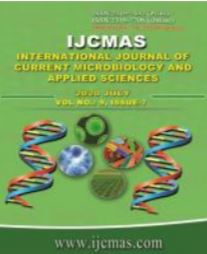


 National Academy of Agricultural Sciences (NAAS)
National Academy of Agricultural Sciences (NAAS)

|
PRINT ISSN : 2319-7692
Online ISSN : 2319-7706 Issues : 12 per year Publisher : Excellent Publishers Email : editorijcmas@gmail.com / submit@ijcmas.com Editor-in-chief: Dr.M.Prakash Index Copernicus ICV 2018: 95.39 NAAS RATING 2020: 5.38 |
Pigeon pea is an important pulse crop of Kharif season in Northern hill zone of chhattisgarh of Madhya Pradesh and primarily grown as rainfed. The productivity of crop is very low (617 kg/ha) due to poor plant establishment method, moisture stress during vegetative and flowering stage and lack of awareness among farmers about the improved production technology. The region is also sensitive for frost. The present work was undertaken to evaluate the effect of system of pigeonpea intensification (SPI technology) on growth and yield of pigeonpea. For the purpose, Frontline demonstrations on SPI were conducted at 37 farmers field in three different villages during the year 2016-17 to 2018-19. The results of the study showed the mean highest yield of 25.85 q/ha by adopting transplanted SPI technology which produced 205.5 per cent higher seed yield over the farmers practice (8.46 q/ha). The average of three years data revealed that technology gap, extension gap and technology index were also noticed as 4.15 q/ha, 17.39 q/ha and 13.83 per cent, respectively. The highest average net profit of Rs. 83681/ha was obtained under transplanted Pigeon pea where as it was only Rs.19403/ha under farmers practice. The cost benefit ratio was found 3.95 and 2.08 under SPI and farmers practice respectively.
 |
 |
 |
 |
 |